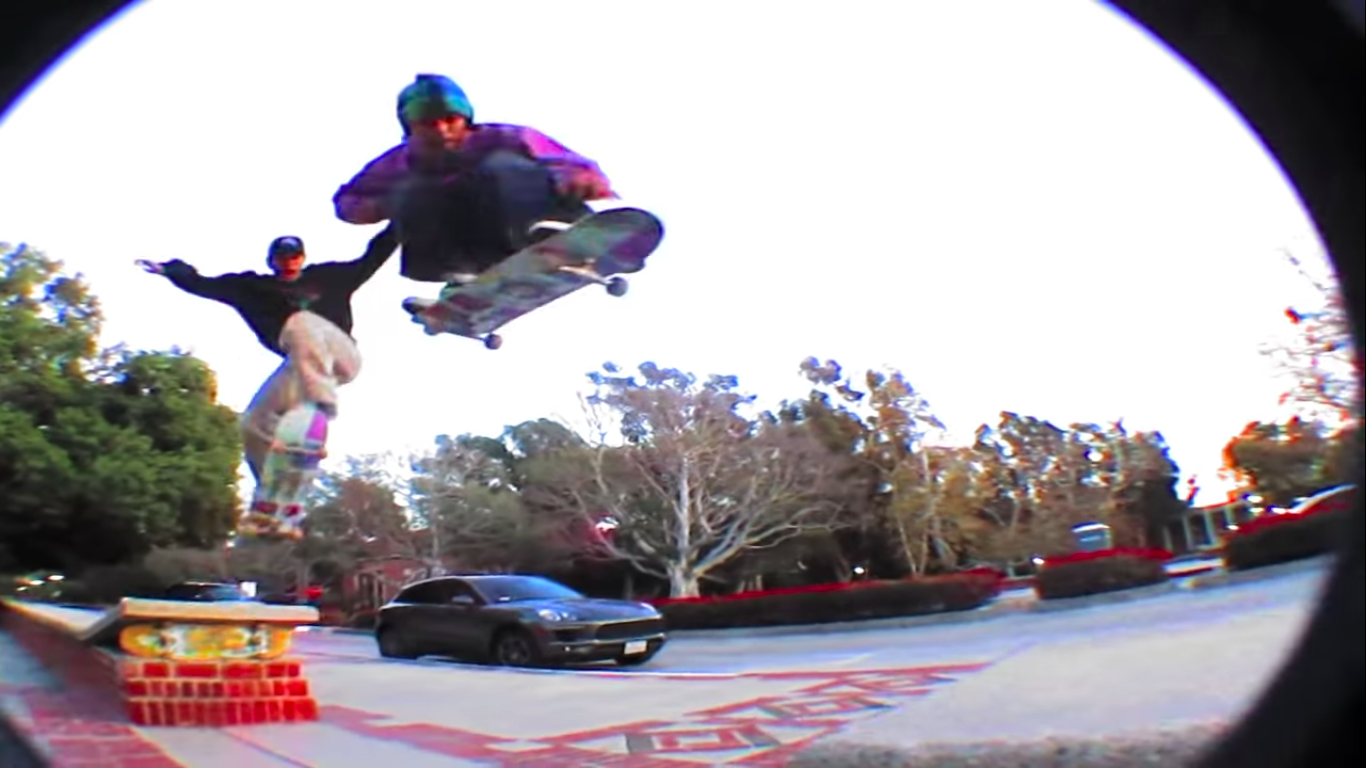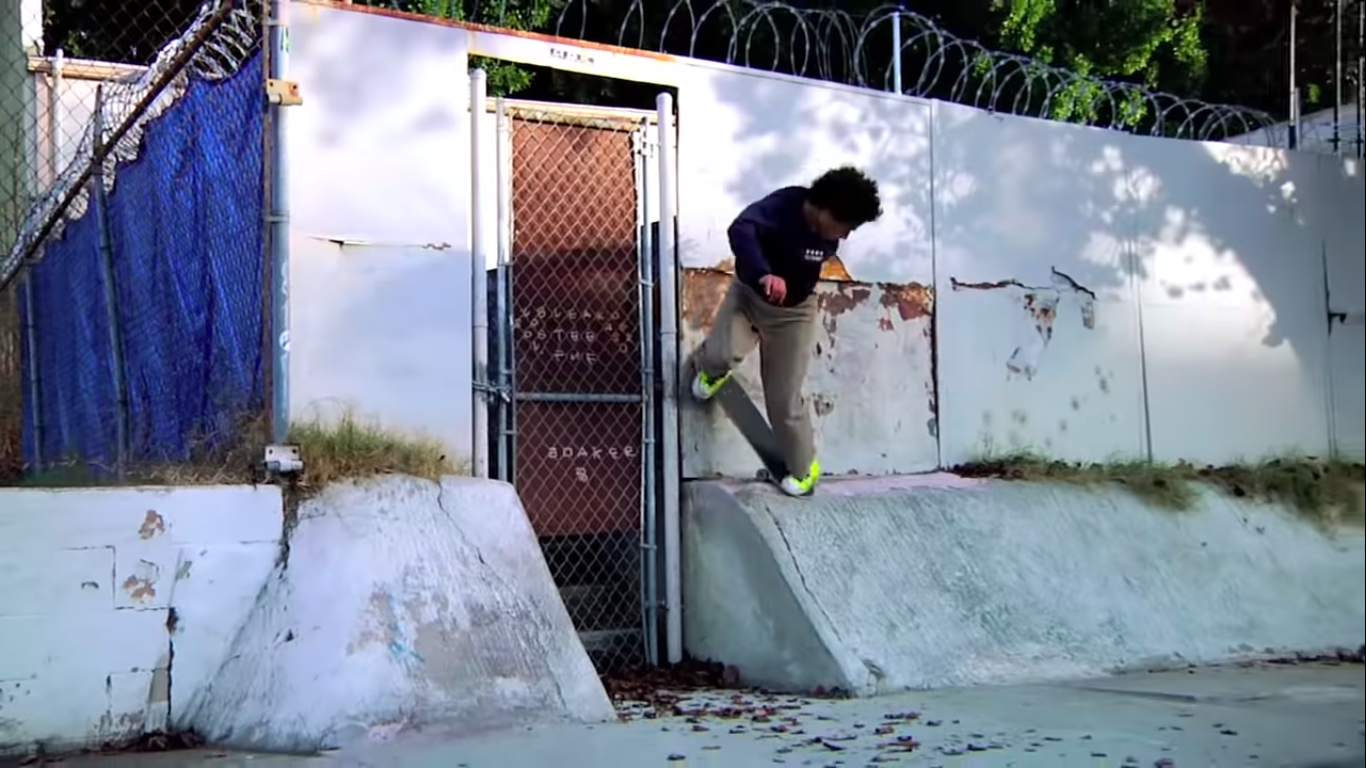The Frogs We Made Along The Way
Sometimes, when I watch a new video by Frog skateboards, the company starts to seem like a self-improvement scheme that would be cooked up on the series Nathan For You (2013-17). The quasi-reality show, which stars comedian Nathan Fielder, follows his well-meaning, but misguided attempts to collaborate with business owners to improve their market share, usually to both comedic and heart rending effects. He might send people on a long, elaborate goosechase up a mountain top to redeem a rebate offer, attempting to befriend some of the participants before they eventually discover the ruse. Or, in order to avoid copyright violations, he infamously rebrands a Los Angeles-area coffee shop as “Dumb Starbucks” under the notion that it is a conceptual art project, a gesture that not only exposes the convoluted circuitry of corporate IP, but also made the national news (actually), positioning Fielder as a kind of folk hero for standing up to the corporate behemoth in a meaningful way. Nathan For You’s commentary on late capitalism frequently takes aim at the stories that we have to tell ourselves to get ahead—or simply to stay afloat—but rather than satirizing them, and self-satisfyingly pointing out people’s faults, he meets the hustle on its own terms, partaking so that these stories can expose for themselves the darkness that lurks just under the surface. To borrow a popular meme from the last several years: for Fielder, maybe the real hustle was the friends we made along the way, a statement that sums up a generational sense of post-irony, in which looking for the brightside only exposes ever more sinister inequalities baked into the system.
Why their latest release, Evan Frankie (frog) makes the company feel like it was born out of Fielder’s brain is this same blurring together of humor and sincerity, where, like Nathan For You, you might go looking for something funny, but rather than simply discover a comedic truth, find yourself at the headwaters of emotional pain. Frog’s logos are a perfect example of this: having been constructed using the rudimentary tools of Microsoft Paint, and comprising simple geometric shapes, they nonetheless squeeze an enormous amount of pathos from these simple drawings. In this particular case, the typically guileless frog logo has been adapted for a stop motion which animates the little frogger in chalk, a frown slashed across his face accompanied by an orange question mark above its head, as if to drive home its own existential, if also charmingly relatable sense of confusion and dismay.
Why their latest release, Evan Frankie (frog) makes the company feel like it was born out of Fielder’s brain is this same blurring together of humor and sincerity, where, like Nathan For You, you might go looking for something funny, but rather than simply discover a comedic truth, find yourself at the headwaters of emotional pain. Frog’s logos are a perfect example of this: having been constructed using the rudimentary tools of Microsoft Paint, and comprising simple geometric shapes, they nonetheless squeeze an enormous amount of pathos from these simple drawings. In this particular case, the typically guileless frog logo has been adapted for a stop motion which animates the little frogger in chalk, a frown slashed across his face accompanied by an orange question mark above its head, as if to drive home its own existential, if also charmingly relatable sense of confusion and dismay.
The same goes for the video’s soundtrack, some moody pop punk, some Jade Tree-era guitar strumming interludes, and the pronounced moan of some late-grunge/early emo, all of which push me, an **older millennial** beyond my own limits for this type of nostalgia, amounting to a kind of emotional overload of awkward childhood memories from the turn of the millennium. Watching the skating within this mindset, you’re not just wowed, or stoked, or even surprised. You’re kind of overwhelmed, skin-crawling even, in a kind of dissociative state, with each back alley clip or fat stack hammer giving off a cozy ASMR feel, making you feel like you need a friend, or both.
That is not to say the video isn’t enjoyable: more, it’s a layered sense of enjoyment, like discovering the Freudian undertones of a Disney movie that meant a lot to you as a child. The skating, too, offers a heavy dose of this troubling, but no less epiphanic realization. In the video’s opening clip, Evan Wasser 5050s a handrail, but it only seems like an excuse to get dirty as he rides, and then eventually tumbles down a dusty hillside. His appearance shifts throughout the part: he adopts the slacker chic of a timeless flannel, or bleaches his fuzzy bald head and slips into a pair of cutoff Dickie’s culottes that I would have seen at Warped Tour ‘98. But overall, his vibe is of the good student, the pair of glasses and shaggy cut giving an earnesty and tenderness to even his most intense, and speedy hurtling. The trick that illustrates what a clever child he is is a fakie shuvit down a long brick 8-stair. Seemingly done in the spirit of good intentions, he delicately and symmetrically folds the board end to end, as if he were setting the dinner table, and had decided to make the napkins look fancy, all on his own innate desire to make things nice for others.
That is not to say the video isn’t enjoyable: more, it’s a layered sense of enjoyment, like discovering the Freudian undertones of a Disney movie that meant a lot to you as a child. The skating, too, offers a heavy dose of this troubling, but no less epiphanic realization. In the video’s opening clip, Evan Wasser 5050s a handrail, but it only seems like an excuse to get dirty as he rides, and then eventually tumbles down a dusty hillside. His appearance shifts throughout the part: he adopts the slacker chic of a timeless flannel, or bleaches his fuzzy bald head and slips into a pair of cutoff Dickie’s culottes that I would have seen at Warped Tour ‘98. But overall, his vibe is of the good student, the pair of glasses and shaggy cut giving an earnesty and tenderness to even his most intense, and speedy hurtling. The trick that illustrates what a clever child he is is a fakie shuvit down a long brick 8-stair. Seemingly done in the spirit of good intentions, he delicately and symmetrically folds the board end to end, as if he were setting the dinner table, and had decided to make the napkins look fancy, all on his own innate desire to make things nice for others.
Whatever the sense of irony or sincerity, hilarity or simply just a desire to feel something, and so isn’t it just funny when you do, no matter how extreme the circumstances were that got you there (I think about how my mom laughs every time something traumatic has happened in our family, that, through her rough, exhausted, and impenetrable exterior, these emotional outbursts could only be expressed as a discomfiting kind of laughter)...I digress. To this **older millennial**, the video’s pastiche of Y2K-era signifiers hits right with (Crazy) Frankie Decker, who doesn’t just pull from that era in terms of fashion choices, but also adapts to the period’s stair-jumping and rail skating, which amounted to skateboarding’s equivalent of nuclear escalation, mounting to higher, longer, and greater feats. The difference between then and now, however, is that Decker performs more tactful hucking (ok, maybe Arto did, too), and doesn’t seem to be in competition with anyone else, finding stair sets that suit Frog’s lost-in-the-attic, family-album sensibility toward the obscure, the discarded, the overlooked, and the cute. He ollies a one-person-wide, cactus-lined set, only to make a landing pad of a single sidewalk block. As if to once again hit home the fact that it’s simply his preference to skate spots no one else wants to skate, he wallies a metal sign chained to the very top of a head-high vestibule, a spot that would surely ensnare anyone else. Multiple times he skates big stair sets that are downhill, be it take off, landing, or both. And, unlike other skaters who skate at this scale, many of whom we commonly position as part of skateboarding’s elite (eww, yuck), Decker doesn’t go off running down the street in some kind of post-touchdown endzone-type of celebration. He is more stoic and calm, even resigned, and one wonders if this isn’t just what he wants to do to make himself happy (even if these spots seem like deathtraps to the rest of us).
Again, as **an older millennial**, I pick up on a state of exhaustion here: with skaters operating at such an extreme level of ability, the iconic spots aren’t worth skating anymore, the cool tricks get disseminated so fast they cease to be cool by the time the video gets put out, and should you want to go big, get ready to literally kill yourself. It can seem, really, that there just aren’t a lot of options left, and that’s the situation just within skateboarding, without mentioning the challenges of paying rent in a rapidly changing world, or worrying over your own lack of agency as the world grows warmer, and possibly worse. But one of the things that this video achieves, as does all Frog releases, is its ability to make Los Angeles feel small, and that, while the fires grow to be an ever more regular occurrence, and images of the city seem more and more dystopian, Frog videos are grounded in the local. Such intimacy bodes well. Rekindling the subcultural sense of belonging is hard to do without creating an artificial sense of scarcity, but Frog’s knowing sincerity answers the call to accessibility, and the general democratic sentiment that skateboarding should be fun. And it does so without the kind of apolitical nonsense that statement often permits, given that “skating should be fun” is often wielded to silence anyone with an opinion, and dog whistles to other jock-minded luddites. But here’s the point: though the company’s blend of self-awareness and innocence can leave you in an uncomfortably indeterminate emotional state, Frog is fun, even when it smiles through the pain. Because, Evan Frankie (frog) reminds us, maybe the real skating was the friends we made along the way. •••



